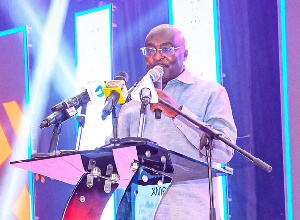Health News of Wednesday, 22 October 2014
Source: GNA
UN Mission advocates community mobilization to fight Ebola
The UN Mission on Ebola ended a nine day visit to three Ebola countries and called for a well-coordinated response for a breakthrough in the battle against the disease.
Abdoulaye Mar Dieye, the Director of the United Nations Development Group (UNDG) in Africa, said, “The response to the devastating Ebola crisis is growing by the day and we must double our efforts to help the three most affected countries end this calamity.”
“The response must put local communities in the lead, and make sure the most vulnerable, including survivors, are able to cope with the economic downturn and rebuild their lives.”
These were contained in a release issued by the UNDP office and copied to the Ghana News Agency in Accra.
“The Ebola health crisis has been threatening the region with economic collapse and is destroying jobs and families while undermining the capacity of governments to provide basic services for their citizens.”
The mission, led by Magdy Martínez-Solimán, Assistant Secretary-General of the UN and Director of UNDP’s Programmes and Policies, visited Ebola treatment facilities, met with community volunteers in some of the poorest urban neighbourhoods and discussed with governments, UN partners and civil society organizations how to accelerate the response.
“We’ve seen tremendous courage at work. While regrettably many countries are closing down their borders and giving in to the stigma, the governments and people of Guinea, Sierra Leone and Liberia are working to fight back against Ebola. We must isolate the disease, not the countries,” said Martínez-Solimán.
The UNDP is negotiating humanitarian access, ensuring that essential services continue, running community engagement campaigns, establishing cash payments to victims and their families and training police and security services to prevent further spread of the disease.
During the three-country mission, Abdoulaye Mar Dieye led a complementary visit to Accra, Ghana, where he met with the newly established UN Mission for Ebola Emergency Response (UNMEER).
He was also received by Ghana’s President John Dramani Mahama, who welcomed the creation of UNMEER and expressed strong support for its mandate.
The chairperson of the Economic Community of West African States (ECOWAS) assured him of the organization’s commitment to maintaining open borders among its Member States. The Ebola epidemic could have a potentially negative impact on the sub-region’s integration.
The UNDP is helping countries not affected by the epidemic to be fully prepared for the possibility of an outbreak, through support for coordination systems and preparation of local responses.
In Dakar, Abdoulaye Mar Dieye chaired a meeting of regional UN directors, aiming to boost the coordination capacity of all agencies involved in the crisis.
The three countries of Guinea, Liberia and Sierra Leone are now expected to lose a total of $13 billion as a result of Ebola, a crisis that could still be felt for ten years, after the disease has been eliminated.
Officials from the United Nations Development Programme (UNDP) have just concluded an eight-day visit to those countries, assessing the situation and aiming to boost UNDP’s programmes on the ground.











